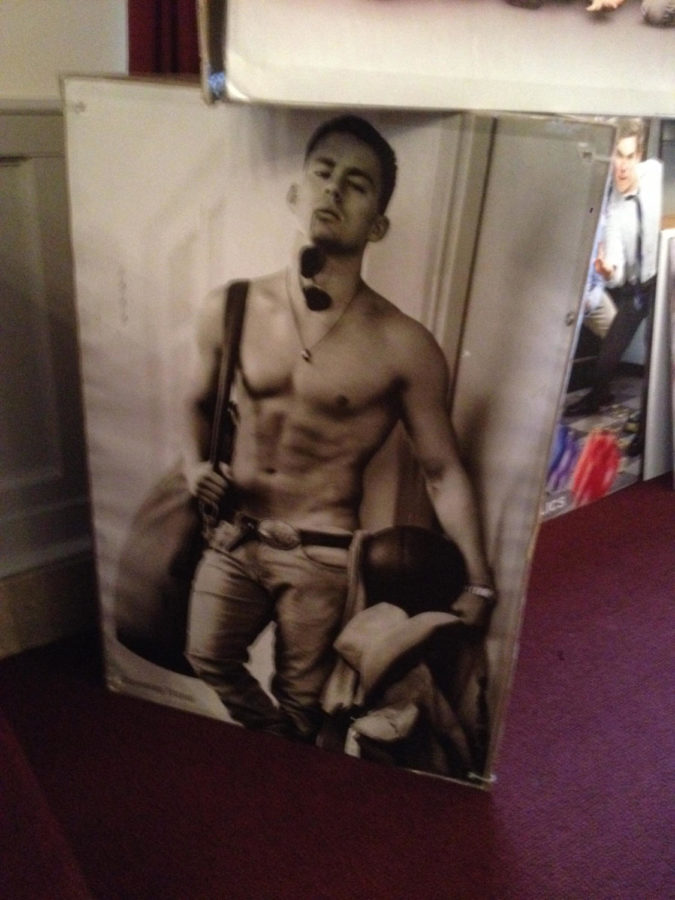Possibly offensive content pointed out in Poster Sale
Charlie Coffey/Iowa State Daily
The ISU poster sale houses a wide variety of posters, but there are ISU students that find some of the posters offensive.
February 11, 2015
Half-naked women, half-naked men, celebrities and movies, the poster sales during each academic year in the Memorial Union have it all. Having it all means that some content that is displayed may evoke offensive responses in some students.
Letitia Kenemer and George Micalone work with the Student Activities Center and a poster company to facilitate the poster sale at Iowa State. No student fees or tuition dollars are used to fund the event. Instead, the poster company pays for all promotion materials, and the Student Activities Center receives a commission of roughly $10,000 from the poster sales annually, which is put toward art programs at the Memorial Union.
“The Memorial Union thinks art is important and so does the rest of the university,” Micalone said.
Anne Ore, junior in software engineering, along with other students, has expressed concern to Kenemer and Micalone regarding some of the material at the poster sale. The poster sale has thousands of posters and some of them display drugs, alcohol and men and women in a sexual manner. Ore said one example of a poster she pointed out showed a woman holding a glass of beer between her breasts, as well as her back being used as a table to support the glass.
“Those [are] textbook examples of objectifying women,” Ore said. “[These women] aren’t even celebrities. You’re not getting this poster because you are a fan of this person. It’s just [a] naked [woman].”
Ore first noticed the material that offended her in August 2013 and took her concerns to Micalone. Ore said Micalone responded explaining that he wasn’t aware of this content and that it would be addressed.
“If anybody ever addresses a concern about the sale, we respond immediately and take action,” Micalone said. “If someone says, ‘these 10 posters we have a concern with’ … okay, then, we’ll stop selling those 10 posters.”
Ore said she still feels the same way about the content of the posters despite knowing the poster sale is not university funded.
“I still feel that the university is somewhat implicitly supporting the messages of the binge drinking, drugs and objectification because the event was allowed to take place in the Memorial Union,” Ore said.
Kenemer said Iowa State has had the poster sale for at least 20 years and the posters are not in any way screened prior to them being put for sale. She said she typically receives one complaint each semester regarding the poster sale from the same group of people.
“I would say that I believe in First Amendment rights and once I start saying ‘you can’t have this one for this reason and this one for this reason’ it’s a snowball effect,” Kenemer said. “There’s probably something in there that could offend someone. It’s a slippery slope to start censoring.”
After voicing concerns to Kenemer and Micalone, Ore shared her concerns to Somchit Mongtin, director of the Margaret Sloss Women’s Center. Ore said Mongtin had a discussion with Kenemer and Micalone regarding the posters that potentially objectified women. After the meeting, Mongtin informed Ore that the SAC and the women’s center had agreed to work together to browse the posters before they go up for sale.
Micalone said the email with Mongtin didn’t establish an expectation that the SAC was supposed to reach out to the women’s center prior to each poster sale taking place.
“I never interpreted it as an agreement. It’s not something that was a guaranteed expectation each time we had a sale. That’s not the way I interpreted it,” Micalone said. “If [the Sloss House] contacted us, we would follow up with them to have a discussion about [the posters they expressed concern over].”
Micalone said if the women’s center took the email statement as an agreement that there was misinterpretation. He said if someone from the women’s center wanted to come to the Memorial Union while the poster sale was being set up and pull posters they felt were concerning, that he would sit down with them and discuss them.
“We recognize that it’s a viable concern and we don’t want to be put into a situation where students are feeling uncomfortable because of something they see on campus,” Micalone said. “We can only address concerns if they are raised to us.”
Mongtin was not available to comment on the email messages.
The SAC is taking the concerns seriously, Kenemer said.
For next year’s sale, Kenemer said she is going to write in the contract with the poster company that she doesn’t want the posters that are being complained about to be put out for sale.
“There are thousands of images up there, thousands, and I would think that most people in general would find something that they’d like,” Kenemer said. “I think it’s great to have an inexpensive way to add art to your living space no matter what the definition of art is.”







